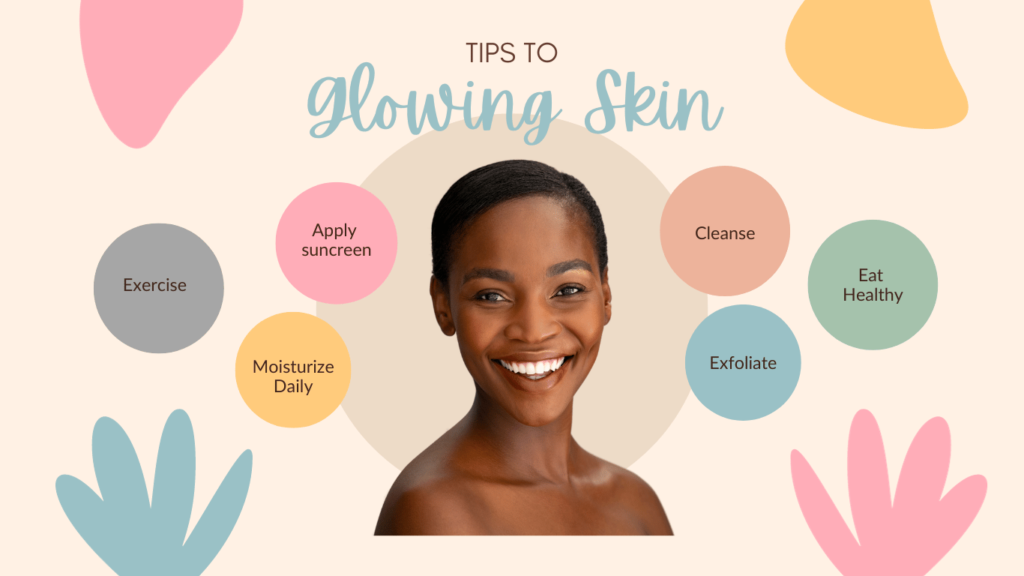Healthy Skin
5 Skin Care Tips for Glowing Skin
Everyone wants glowing skin, but it can be tough to achieve. With so many different skincare products on the market, it can be hard to know where to start. And even if you’re using the right products, it’s not always enough. There are other factors that can affect your skin’s health, such as diet, lifestyle, and stress levels.
But don’t worry, there are a few simple things you can do to get glowing skin. Here are five skincare tips that will help you achieve your radiant complexion goals:
1. Cleanse Your Face Twice a Day
The first step to any good skincare routine is to cleanse your skin twice a day, once in the morning and once at night. This will remove dirt, oil, makeup, and other impurities that can clog your pores and lead to dull skin.
When choosing a cleanser, be sure to select one that is appropriate for your skin type. If you have dry skin, for example, you’ll want to avoid cleansers that are too harsh or drying. If you have oily skin, you’ll want to choose a cleanser that can help to remove excess oil and sebum.
Here are some tips for cleansing your skin:
- Use lukewarm water, not hot water. Hot water can strip your skin of its natural oils and lead to dryness.
- Apply a small amount of cleanser to your fingertips and massage it gently into your skin.
- Be sure to cleanse your entire face, including your neck and hairline.
- Rinse thoroughly with lukewarm water and pat your skin dry with a clean towel.
2. Exfoliate Your Skin Regularly
Exfoliation is another important step in any good skincare routine. It helps to remove dead skin cells that can build up on the surface of your skin and make it look dull and lifeless.
There are two main types of exfoliation: physical and chemical. Physical exfoliation uses a physical abrasive, such as a scrub or exfoliating brush, to remove dead skin cells. Chemical exfoliation uses acids to dissolve dead skin cells.
Which type of exfoliation is best for you depends on your skin type. If you have sensitive skin, you may want to avoid physical exfoliation, as it can be too harsh. Chemical exfoliation is a good option for people with all skin types, but it’s important to start slowly and gradually increase the frequency of use to avoid over-exfoliating.
Here are some tips for exfoliating your skin:
- Exfoliate once or twice a week, depending on your skin type.
- If you’re using a physical exfoliator, be gentle and avoid scrubbing too hard.
- If you’re using a chemical exfoliator, follow the directions on the product label carefully.
- Don’t exfoliate too often, as this can irritate your skin.
3. Moisturize Your Skin Regularly
Moisturizing is essential for healthy, glowing skin. It helps to keep your skin hydrated and protected from the elements.
When choosing a moisturizer, be sure to select one that is appropriate for your skin type. If you have dry skin, you’ll want to choose a heavier moisturizer. If you have oily skin, you’ll want to choose a lighter moisturizer.
Here are some tips for moisturizing your skin:
- Apply moisturizer to your face and neck twice a day, once in the morning and once at night.
- Apply moisturizer to your skin after cleansing and exfoliating.
- If you have dry skin, you may want to apply moisturizer more often.
- If you have oily skin, you may want to use a blotting paper to remove excess oil throughout the day.
4. Protect Your Skin From the Sun
Sunscreen is one of the most important skincare products you can use. It helps to protect your skin from the sun’s harmful UV rays, which can cause premature aging, wrinkles, and skin cancer.
When choosing a sunscreen, be sure to select one that is broad-spectrum and has an SPF of 30 or higher. You should also reapply sunscreen every two hours, or more often if you are sweating or swimming.
Here are some tips for using sunscreen:
- Apply sunscreen to all exposed skin, including your face, neck, ears, and hands.
- Apply sunscreen 30 minutes before going outside.
- Reapply sunscreen every two hours, or more often if you are sweating or swimming.
5. Eat a Healthy Diet
What you eat and drink can have a big impact on your skin health. Eating a healthy diet that is rich in fruits, vegetables, and whole grains will help to give your skin the nutrients it needs to be healthy. Drinking plenty of water will also help to keep your skin hydrated.
Conclusion
Following these five tips will help you achieve glowing skin. However, it’s important to remember that everyone’s skin is different, and what works for one person may not work for another. If you have any concerns about your skin, be sure to consult with a dermatologist.

